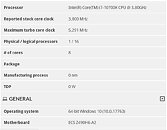Wednesday, February 12th 2020

Intel Core i7-10700K Features 5.30 GHz Turbo Boost
Intel's 10th generation Core "Comet Lake-S" desktop processor series inches chose to its probable April 2020 launch. Along the way we get this fascinating leak of the company's Core i7-10700K desktop processor, which could become a go-to chip for gamers if its specifications and pricing hold up. Thai PC enthusiast TUM_APISAK revealed what could be a Futuremark SystemInfo screenshot of the i7-10700K which confirms its clock speeds - 3.80 GHz nominal, with an impressive 5.30 GHz Turbo Boost. Intel is probably tapping into the series' increased maximum TDP of 125 W to clock these chips high across the board.
The Core i7-10700K features 8 cores, and HyperThreading enables 16 threads. It also features 16 MB of shared L3 cache. In essence, this chip has the same muscle as the company's current mainstream desktop flagship, the i9-9900K, but demoted to the Core i7 brand extension. This could give it a sub-$400 price, letting it compete with the likes of AMD's Ryzen 7 3800X and possibly even triggering a price-cut on the 3900X. The i7-10700K in APISAK's screenshot is shown running on an ECS Z490H6-A2 motherboard, marking the company's return to premium Intel chipsets. ECS lacks Z390 or Z370 based motherboards in its lineup, and caps out at B360.
Source:
TUM_APISAK (Twitter)
The Core i7-10700K features 8 cores, and HyperThreading enables 16 threads. It also features 16 MB of shared L3 cache. In essence, this chip has the same muscle as the company's current mainstream desktop flagship, the i9-9900K, but demoted to the Core i7 brand extension. This could give it a sub-$400 price, letting it compete with the likes of AMD's Ryzen 7 3800X and possibly even triggering a price-cut on the 3900X. The i7-10700K in APISAK's screenshot is shown running on an ECS Z490H6-A2 motherboard, marking the company's return to premium Intel chipsets. ECS lacks Z390 or Z370 based motherboards in its lineup, and caps out at B360.

273 Comments on Intel Core i7-10700K Features 5.30 GHz Turbo Boost
AMD choose a different route with Bulldozer, as a way to rapidly increase CPU cores instead of supporting SMT like Intel AMD went the physical route and found a way to increase CPU cores instead.
Obviously this didn't work, which is why AMD hired Jim Keller, CPU Architect genius.
You can have the 64-core Ryzen Threadripper 3990X and it only needs future shrinks which will be sufficient enough.
A great example of this is what we are seeing today. ZEN to ZEN2 to upcoming ZEN3 etc.,
Note: ZEN+ was suppose to have been the original ZEN. That's why AMD officially announced no more plain old refreshes like for example a ZEN2+ or a ZEN3+...The only people that will buy Intel Processors are none tech savvy people and those that don't research tech on a daily basis. And still to date, many retailers still pushing Intel for general use computing and gaming despite Ryzen being far superior. But not everywhere though, as Ryzen does very well online with real reviews that people read then decide.
Does great for me I am not trying to say my 8350K wouldn't be a bottleneck on a system with two 2080Ti ... because in that case yes it would bottleneck that system.
I was more pointing out that people just getting so mad about something so little and something they can't even control. You can control it with your buying habits, yelling at each other in a forum post isn't doing anything. ;)
Single core performance is no longer important, and in the future it will become ever less important.
Skylake may be on "life support", not because it's bad, it's very impressive for an architecture from 2015, but because we need higher IPC to scale further and these current clock speeds are really not sustainable.
Hopefully developers further take advantage of at least 16 threaded CPUs as a default standard. This should be pushed industry wide ASAP.
Intel holds a very slight lead in gaming performance over Ryzen. ZEN3 will eliminate that lead based on what information is available about it.
Applications in general do slowly scale better with multiple threads, but even here there are theoretical limits to what is achievable. Even with the best efforts, most synchronized workloads (like most client applications are) will see a scaling drop-off around 8 threads, and not scale well beyond 16 threads. Asynchronous workloads scale nearly perfectly though, but very few of those are relevant for end-users. Anything beyond 8 cores is more relevant for users running multiple applications simultaneously rather than single applications.
when I'm loading games on my 128gb sata ssd I get roughly the same times as a 970 Pro owner.so 970 pro isn't better in general.
The 970 will win more synthetics, but if nothing you do with it is faster irl, is it really faster in general? Is a Ferrari faster than a Corolla in general, if all you do with it is drive through town?
what the hell am I even expleining right now.
Once they hit sub 1 micron they started measuring in nanons (nm)
I suspect once they get to 1nm or under they'll start announcing architecture lithography by picons (pm) 1000pm to 1nm.
AMD is going to increase prices, get ready.